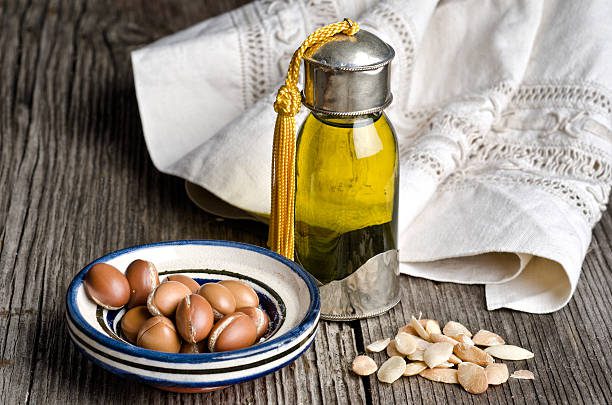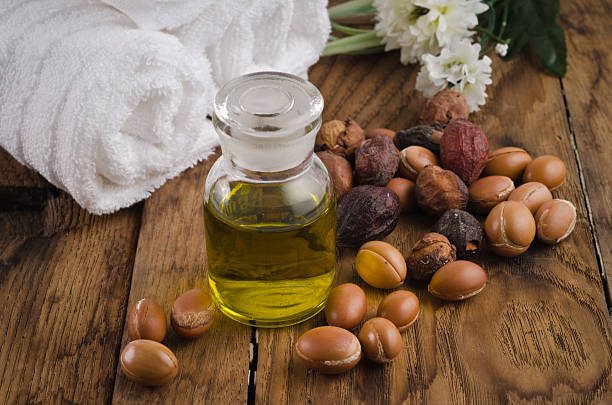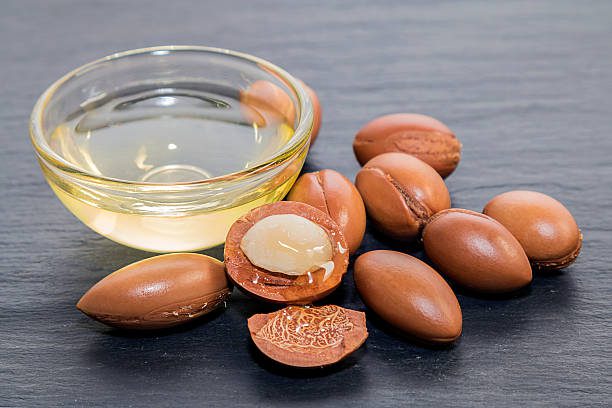Argan oil in Moroccan cuisine
Hiding in the warm sunlight of Morocco, there is a gem that tried to influence the country’s cuisine for several hundred years. This oil, also referred to as liquid gold, is gradually gaining popularity across the world for its nutritional and skin care properties. But in its country of origin, this treasure is not the leading player in the thrilling canvas of Moroccan food.
However, in this particular article we are going to explore further the cultural background as well as the versatility of this Argan oil in Moroccan cuisine. In this course, we uncover how this distinctive ingredient enhances the taste, nutrient profile, and variety of the traditional and new-generation foods in the region.

The Origins of Argan oil in Moroccan cuisine
A Brief History
Argan tree is an endemic species of south-western Morocco that has been existent in this region for millions of years. The Berber people of North Africa have known for centuries the benefits of Argan oil and have included it in their diet.
Argan oil has been an ingredient of Moroccan cuisine for centuries because of it being rich in nutrients and having a delicious nutlike taste. Cooking with it has been going on for centuries in those traditional meals that are handed over generations and communities.
The Production Process
The transformation of argan nut into culinary oil is a time-consuming process that has traditionally been performed by the women of Morocco’s countryside cooperation. The fruit is opened and the kernels removed, followed by sun-drying and shelling of the nuts. These kernels are then roasted so they can be baked to bring out their flavor, and then they are ground and compressed to produce the oil.
The same method of production makes a valuable contribution to the taste and quality of Argan oil, which is used in Moroccan cuisine. This careful roasting method gives the culinary Argan oil its unique nutty flavor that does not characterize cosmetic Argan oil.
Argan Oil in Moroccan Cuisine, Part 2
Amlou: The Moroccan Nutella
Among the most popular forms of consuming Argan oil in Moroccan cuisine is amlou, which is thick cream-like spread and sometimes called Moroccan peanut butter or Moroccan nutella. This luxurious product incorporates argan oil with ground almonds and honey, which give the food a great taste and desirable consistency.
This is taken usually for breakfast, smeared on bread, or used to dip fruits in it. It is highly relished by both citizens and tourists due to its fabulous taste, originating from the nuts and its silky texture.
Tagine Enhancements
Indeed, Moroccan civilization is simply incomplete without tagines coming on top of any list of prominent Moroccan staples. These slow-cooked stews that are derived from the name of the conical clay pot are usually garnished with argan oil. The used oil brings an extra dimension to the flavors of the meat and the vegetables, as well as the spices.
Argan oil has a mild, nutty flavor and is added to the taste of tagines, enhancing the total flavor profile of the most popular Moroccan dishes.
Argan oil in Moroccan Cuisine Today
Salad Dressings and Marinades
Moroccan chefs in large part today have adopted Argan oil in preparing salads and barbeques in particular. It has a subtler flavor to olive oil, making it perfect for dressings that complement salads with citrus fruits, honey, and aromatic herbs.
In marinades, the Argan oil of Argan initiates a delicate sort of nuttiness to meat and vegetables and denotes their inherent qualities without overwhelming them. This application presents how the oil can fit well not only in conventional but also in newly developing Moroccan dishes.
Gourmet Finishing Oil
Unlike other oils that are household names, argan oil is now a specialty finishing oil in Moroccan cuisine, just as the finest olive oil is in other parts of the world. Every now and then, we just need that last finishing touch of gravy, and it can be over soup, meat on the grill, or steaks that are roasted.
This use of Argan oil in Moroccan cuisine not only forms those important tastes but also creates the impression of opulence and real food for the eatery.
The nutritional benefits of Argan oil in Moroccan cuisine
A Healthy Addition
Despite the great number of Moroccan recipes using argan oil, its benefit is not only taste but also healthy elements. Vitamin E and essential fatty acids are incorporated, while antioxidants make argan oil a healthy ingredient in Moroccan foods.
Superfoods, which include argan oil, can be very beneficial for the heart and skin and offer anti-inflammatory qualities when taken in moderation. Such uses have been known for many years in Moroccan traditional medicine and are only now coming to the attention of nutritionists.
Culinary Versatility
The fact is that Argan oil in Moroccan cuisine can be used in practically any dish, so it is quite simple for individuals to have something truly useful for their body. Moroccan argan oil can be used for all meals: breakfast, mid-morning meal, mid-afternoon meal, supper, and many others, for it adds an incomparable taste to the food.
Living Through Traditions and Moving Forward to Innovations
Sustainable Practices
The increasing global market for argan oil has resulted in enhanced measures to address the sustainable production of argan forests in Morocco. Of course, this aim is also to sustain the environment, but the local people whose livelihood depends on the Argan oil production will equally benefit.
Today there are multiple Moroccan chefs and food producers who are focusing on the sustainable method of Argan oil production to make sure that this ingredient in Moroccan cuisines will remain available in the future.
Fusion Cuisine
As much as Moroccan food is not yet fully on the international map, chefs have been incorporating Argan in various hybrid cuisines. This cross-cultural exchange is helping Moroccan Argan oil find new markets and, at the same time, creating more ideas for dishes to prepare with it.
From pasta to desserts, Argan oil, a condiment of Moroccan origin, is gradually trending in world kitchens with its unique flavor of nutrition.

Conclusion
Speaking of Argan oil, it is possible to note that Moroccan cuisine contains the word functional and embraces its traditions together with the ability to develop and suit the European palettes. Whether from generation to generation recipes or new dishes of modern Moroccan chefs, this wonderful oil—Argan oil—remains popular in Morocco.
As we’ve seen earlier, Argan oil in Moroccan cuisine is not just used to add flavor to the dish. These are images of a bond with the soil, continuity of a native culture, and a passage to contemporary healthy eating. Rich Argan oil can be poured over a hot tagine, used for whisking a vivid Moroccan salad dressing, or enjoyed within the lush taste of Amlou. Argan oil is an indissolvable part of Moroccan cuisine.
FAQs
Can I use Argan oil for high-heat cooking in Moroccan cuisines?
And even though argan oil is all-purpose, it is recommended to be used as a low- to medium-temperature cooking oil or used to garnish Morroccan dishes. Due to its mild taste and rich nutritional value, this food should not be cooked at very high temperatures.

